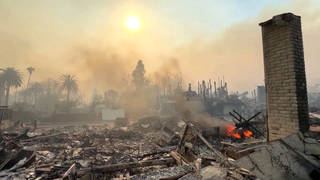
By Amy Goodman & Denis Moynihan
Record-shattering temperatures are baking the northern hemisphere, causing death, injury and displacement. From China to Europe to the United States, regions are breaking not only high temperature records, but are also surpassing the record number of consecutive days of life-threatening heat. Phoenix, Arizona passed 20 days with high temperatures above 110 degrees Fahrenheit. Massive rain storms and typhoons are flooding cities and towns from India to southern China to New England. Raging Canadian wildfires are blanketing the eastern United States with thick smoke that can cause long-term respiratory damage.
“The extreme weather – an increasingly frequent occurrence in our warming climate – is having a major impact on human health, ecosystems, economies, agriculture, energy and water supplies,” World Meteorological Organization Secretary-General Petteri Taalas commented on Wednesday, adding, “We have to step up efforts to help society adapt to what is unfortunately becoming the new normal.”
When Taalas says “help society” he isn’t referring to any particular country; he means human society, globally. A truly effective solution to the climate crisis must be global, based on the rapid transition from fossil fuels to renewable energy. This transition is going to be costly, but the cost of doing nothing would be far greater. The question is, who is going to pay?
It has long been acknowledged inside the annual United Nations climate negotiations that wealthy nations have contributed more to the climate crisis than poorer nations. These summits are referred to as “COPs,” for “Conference of Parties” to the United Nations Framework Convention on Climate Change, the UNFCCC. In the often complex parlance of the COPs, this concept is called “Common But Differentiated Responsibilities,” recognizing that countries like the United States and those of western Europe grew rich by burning fossil fuels with abandon for over a century, while poorer countries in the Global South, many now facing the worst impacts of climate change, have contributed negligibly to carbon levels in the atmosphere.
At COP15 in Copenhagen, in 2009, President Obama and Secretary of State Hillary Clinton announced to much fanfare and acclaim that $100 billion per year would be made available to developing nations by 2020.
“The G7 countries owe $13.3 trillion to the low- and middle-income countries. That’s massive,” Amitabh Behar, interim executive director of Oxfam International, said on the Democracy Now! news hour last May, as the G7 group of wealthy nations was meeting in Hiroshima. “If you increasingly look at the massive damages happening because of the climate crisis, particularly in the South, somebody needs to take responsibility for that. It’s fairly clear, report after report, that the G7 countries are significantly responsible for these emissions. At this moment, they owe $8.7 trillion in terms of loss and damages. That’s something that must be put up front by the G7 countries, but that’s not happening.”
The “Loss and Damages” Behar refers to is the term used at the COPs to describe the current devastation being inflicted by climate change on frontline communities around the world. At COP27 in Sharm el-Sheikh, Egypt last year, member nations agreed to a voluntary mechanism to provide “loss and damage” funding to impacted countries.
“Loss and Damage” falls under a broader concept used by climate justice activists to hold polluting countries accountable, called “climate reparations.” This arose in a recent House Foreign Affairs subcommittee hearing, when the Republican chair, Brian Mast was questioning John Kerry, President Biden’s Special Presidential Envoy for Climate:
Mast: “Are you planning to commit America to climate reparations? That is to say, we have to pay some other country because they had a flood or they had a hurricane or a typhoon or a wildfire.”
Kerry: “No, under no circumstances.”
Mast: “Very good. I’m glad to hear you say that.”
While Kerry and Republican subcommittee members sparred over just about every other topic, they emphatically agreed on that key point: the United States would take no responsibility as the world’s largest historical emitter of greenhouse gasses.
With the string of catastrophes striking the northern hemisphere, the science is unequivocal: the rapidly worsening climate crisis is making these weather events more frequent and more intense.
Rolling Stone reporter Jeff Goodell, author of the new book, “The Heat Will Kill You First: Life and Death on a Scorched Planet,” said on Democracy Now!, “We have not at all come close to grasping the scale and scope of the crisis we’re facing.” Goodell was amplifying what he wrote in his recent New York Times essay, “All living things, from humans to hummingbirds, share one simple fate. If the temperature they’re used to rises too far, too fast, they die.”











Media Options